Peter MALONE
Saturday, 18 September 2021 18:47
Quiet American, The/1958
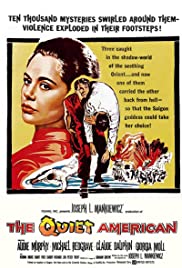
THE QUIET AMERICAN
US, 1958, 116 minutes, Black and white.
Audie Murphy, Michael Redgrave, Claude Dauphin, Georgia Moll, Bruce Cabot, Kerima.
Directed by Joseph L. Mankiewicz.
The Quiet American is based on the novel by Graham Greene. It appeared in the early 50s, focusing on the European presence in Indo-China?, especially that of the French and the battles in Vietnam during the early 1950s which culminated in the defeat of the French at Dien Bien Phu. Graham Greene was a world correspondent, a great traveller as well as a novelist. In his novel, at the height of the Cold War and critique of the communist system, Greene offered an insight into the presence of the French in Vietnam and of the looming American presence. Within ten years of the publication of the novel and five years of the release of the film, the Americans would become entangled in a Vietnam war.
The Quiet American focuses on an enigmatic young man who seems to be present in Vietnam for compassionate aid. Instead, he is an operative of the CIA and instrumental in setting up political tensions and a rival third force to combat both the communists and the local regime.
Michael Redgrave brings great dignity to his role as the English journalist in Vietnam, although he seems too refined for the performance. Audie Murphy, on the other hand, is perfectly cast as the quiet American. With knowledge of his war record, the most honoured soldier in World War II and author of his memoir and film, To Hell and Back, even in the late 50s Murphy seemed particularly baby-faced, defying belief that he was such a skilled soldier. This gives credibility to his undercover CIA role.
The film was written and directed by Joseph L. Mankiewicz, celebrated director of such films as A Letter to Three Wives, All About Eve, Julius Caesar, Guys and Dolls, The Honey Pot, Sleuth. He was also the writer director of the ill-fated Cleopatra.
In 2002, Philip Noyce's remake of the film was released. Michael Caine was excellent as the journalist, much more credible than Michael Redgrave. Brendan Fraser, with his history of comic roles, is also effective as the quiet American. The film was anti-American in tone, released just before the Iraq war. Michael Caine was nominated for an Oscar. The film also took on the story of Vietnam into the 60s with the central character becoming a war correspondent, reporting the American war.
The film is interesting in itself, a version of Graham Greene, an insight into the perspective of the 50s, and an interesting comparison with the remake.
1. An interesting film? In its time? Its perspective on Vietnam? As seen in the light of the history of the latter part of the 20th century? (In comparison with the 2002 remake and its perspective in hindsight?)
2. The work of Graham Greene, his observations on countries, politics, intrigue? His skill at dramatic confrontations, mystery, politics?
3. The black and white photography, the atmosphere of Vietnam, Saigon, authenticity? The musical score?
4. A film of the late 50s, the political situation in the 50s, the Cold War, European presence in Indo- China, the conflict with the French in Vietnam? The collapse of Dien Bien Phu in 1954? Power struggles, the elected government, the communist uprisings in the north, the politics of the third force and the ideas of the CIA, later adopted by the American government?
5. The Americans, their interest in Indo- China, their neo-colonial attitudes and power, wanting to save the world, believing in their destiny, intervening in Vietnam? Graham Greene and the film as prophetic of the 60s and 70s?
6. The presence of the British, the journalists, their observing, reporting?
7. The French administration, the police, the investigation of terrorism, of the actions of the American? His death?
8. The visualising of the communists, their plots, manoeuvres? The stance of the film as pro or anti-American?
9. The impact of ideas, Fowler and his discussion with the American? The American and the books? The contrast between theory and reality?
10. The flashback nature of the film, the information about the American's death, in the river, Thomas Fowler and his involvement, the questions of the police chief, the investigation of the body? The new year, Tom and Phuong and her grief at the American's death?
11. The portrait of the American, his arrival, dapper appearance, coat and tie, his book and the third force, humanitarian aid? His admiration for Fowler, going out with him, the dance hall, meeting Phuong, attracted, explaining it to Tom, courting her? Her sister's caution? His going up-country, meeting Tom, helping him, the trip, the tower, the attack, helping him escape? His later appearance in Saigon, his knowledge of the Vietnamese, Fowler seeing that there was something more beneath the surface? His being linked with the toxins and chemicals? His being perceived as a danger, the communist forces, the plot against him, setting him up, his going to his death, the brutality of his death?
12. The character of Tom Fowler, his background, his wife left in London, his relationship with Phuong? An easy life, his dislike of London, his finding life easy in Vietnam? The meeting with the American, being flattered by him? Taking him to the club, finding a rival for Phuong? Phuong and her decision to go with the American? Its effect on him, writing to his wife, the issues of divorce, lying to Phuong and her sister? Her sister's protectiveness? His decision to do an article, going up-country, interviews and observations, the siege, the American coming to his help? The further investigations, the chemicals, the information from the communists, the pressure on him to betray the American? The set-up, the issue of the book, the discussion, the signal, allowing the American to go to his death? His interaction with the police, nothing being able to be laid at his door? The rendezvous, the discussion, the ending?
13. Phuong, her background, her sister, in the clubs, the dancers, prostitution, survival? Her relationship with Fowler and love for him? Attracted to the American, going with him? Her grief at his death?
14. The human face of Vietnam at this time, the French in Indo- China, the colonial power, the Vietnamese and their reaction against the colonial masters, the terrorism, the brutality in the streets, the war, the emerging generals, the build-up to the defeat of the French? The entanglement of the Americans?
Published in Movie Reviews
Published in
Movie Reviews
Tagged under
Saturday, 18 September 2021 18:47
Q Planes/Clouds over Europe

Q PLANES (CLOUDS OVER EUROPE)
UK, 1939, 82 minutes, Black and white.
Ralph Richardson. Laurence Olivier, Valerie Hobson, George Merritt, George Curzon, Gus Mc Naughton, David Tree.
Directed by Tim Whelan.
Q Planes (Clouds Over Europe) is an entertaining comedy spy melodrama just before World War Two. The film is a London Films production, backed by Sir Alexander Korda. It has an excellent cast with Ralph Richardson giving one of his best performances as a daffy civil servant spy. Laurence Olivier is the rather conventional hero and Valerie Hobson is all energy and style as the heroine. There are some very amusing lines - including John Laurie's criticism of Valerie Hobson for being too enthusiastic - "after all, this is England". The film is rather dated but shows the perennial ingredients of the espionage thriller. It is a still entertaining indication of London Films' cinema style of the '30s. Direction is by Tim Whelan, an American director who worked for Korda for some time and then returned to Hollywood.
1. Entertaining British spy comedy? The British film industry of the '30s? The work of Alexander Korda? A glimpse of the stars early in their careers? Spies, patriotism, humour? Hitler's Europe and the eve of World War Two? Now?
2. Black and white photography, production values, London in the '30s, the technology of planes and ships? Location photography? Special effects? The score?
3. The stars and their later reputations? Ralph Richardson and his flair for comedy?
4. The comic touch with Hammond and the opening, seeing him at work, his being arrested, the comedy routines covering the serious effort, the police, the umbrella, his manservant? Hammond and his British eccentricities? His absent-mindedness yet skill at detection? Oblivious and shrewd? His interviews with the authorities? The infiltration into the plant? The following of Jenkins and his death? The clash with Mc Vane and their growing friendship? His clashes with Kay and her investigations? His being taken off the case despite his credentials? His going home to cook and suddenly leaving with a brainwave? His snooping? Discovery of the truth? His gentlemanly gung-ho attack at the end? The humorous refrain of the phone calls to Daphne and postponing their appointment? His discovery that she was married? The understated eccentric British humour - as the style for the Secret Service?
5. Mc Vane and Laurence Olivier's earnestness? His work as a pilot, skills, grudges? The encounter with Kay at the canteen and the clash when he found her ringing the newspaper? The discovery of the truth and his embarrassment? Their continued clashing and falling in love? His following Jenkins and discovering Hammond at the death? His going up in the plane? The farewell to Kay? The heroics and the British fight against the Germans at the end? The noble British warrior hero, '30s style?
6. Kay and her work in the canteen, her talk and inquiry, the slap and getting the sack, phoning the news through, her work with the editor, the clashes with Mc Vane and their falling in love, her tormenting her brother? Her help with the detection? Happy ending? The plucky British heroine?
7. The Secret Service and the authorities, patriotism, style?
8. British industry and technology in the '30s? Development of planes? Pig-headedness? The British government depending on the finance and goodwill of the industrialists? The tests and their failure? The group of pilots and their morale?
9. Spies, covers, money deals, agents? The planes and the desperate means to steal them?
10. The techniques of stealing the planes, washing the wreckage ashore? The salvage vessel? The anticipation of World War Two with the plucky British fighting to the death at the end? The effectiveness of this morale-boosting and patriotism?
11. The blend of the mock-heroics with the heroics? Comparisons with later spy films? The perennial themes despite the big-budget spectaculars of later decades?
Published in Movie Reviews
Published in
Movie Reviews
Tagged under
Saturday, 18 September 2021 18:47
Quiller Memorandum, The
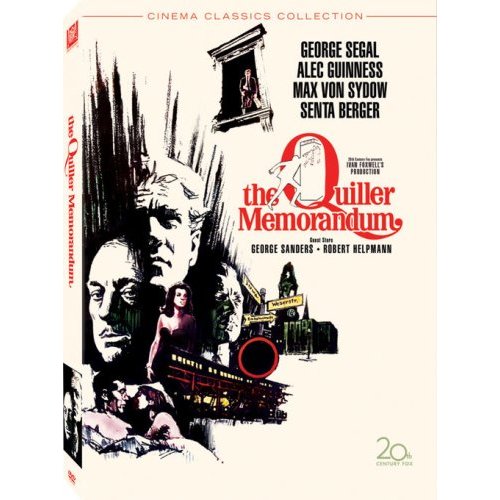
THE QUILLER MEMORANDUM
UK, 1966, 104 minutes, Colour.
George Segal, Alec Guinness, Max Von Sydow, Senta Berger, George Sanders, Robert Helpman, Robert Flemyng.
Directed by Michael Anderson.
The Quiller Memorandum is an efficient spy melodrama of the kind we have come to expect from films made from 1965-70. It shows disillusioned spies, icily unfeeling controls, potential traitors and clever character performances from the supporting cast.
But this film should have been much better than it is. Harold Pinter wrote the screenplay (he wrote The Pumpkin Eater, The Servant, Accident, The Go-Between). Direction is by Michael Anderson who has not achieved so well with the large tasks he has undertaken, e.g. The Shoes of the Fisherman, Pope Joan. As with most efficient spy thrillers, many questions are raised.
1. Was this a typical spy thriller? Why?
2. The central issue of the film was Neo- Nazism. Was this a particularly interesting issue? How relevant is it to contemporary European politics?
3. Was Quiller an engaging hero? Why?
4. How was Berlin itself one of the characters - was this important for the Neo- Nazi issue? How?
5. What irony was there in Pol's saying that the Neo- Nazis were just like everyone else in appearance?
6. What comment was there on the English way of doing things - the off-handed remarks, the dinners and Pol's breakfast.
7. what did you learn about the German and European situation from Quiller's interviews as Cooper. the journalist?
8. Did you understand what the Neo- Nazis were trying to do and why they acted so desperately?
9. Did you suspect Inger at any time of being a spy?
10. What is the morality of being a spy? Are all things lawful? Why?
11. Do films like this show a 'realistic' picture of a spy's life?
12. Had Quiller changed by the end of the film? Did he understand himself better? Was he disillusioned? Cynical?
Published in Movie Reviews
Published in
Movie Reviews
Tagged under
Saturday, 18 September 2021 18:47
Quiet Man, The
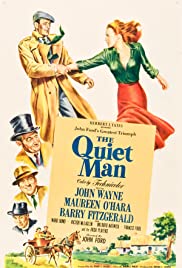
THE QUIET MAN
US, 1952, 130 Minutes, Colour.
John Wayne, Maureen O' Hara, Barry Fitzgerald, Ward Bond, Victor Mc Laglan, Mildred Natwick, Arthur Shields.
Directed by John Ford.
The Quiet Man is one of John Ford's most entertaining films. It stars one of his favourite actors, John Wayne, who had appeared in Stagecoach, The Long Voyage Home and many Westerns during the 40s and 50s and into the 60s. He was often teamed with Maureen O' Hara in Ford's films, eg. Rio Grande, Wings of Eagles. Victor Mc Laglan, Barry Fitzgerald, Mildred Natwick, Ward Bond, who had appeared in many Ford films, also feature here. It is a very entertaining story of Ireland, full of Irish flavour and style. The colour photography is very beautiful. All in all, excellent cinema entertainment.
1. How ironic was the title? How was the quiet man the central figure of this film? How important was the contrast between Ireland and America in this film?
2. How was Ireland a strong character in the film? What beauties and love of Ireland emerged from the film? How was Ireland made to contrast with the U.S.? The colour, beauty and tranquillity of Ireland? The manners of Ireland? The old-world customs? How was this illustrated immediately by the train's arrival and the discussion at the station about the way? Of Michaeleen's presence with the buggy?
3. How humorous a film? Wat it a good comedy? Its main comedy ingredients? How were they successfully presented?
4. Sean Thornton as the central character. Why had he returned? Did it matter that this was not known until later in the film? What hopes did he have from Ireland? How proud was he of his heritage? His wanting to buy his home? Was it normal that he should have wanted to marry Mary Kate? His strengths? The impression of cowardice that he gave? The fact that he would put up with this? His amazement at the customs of courting? His withstanding the taunts of Red? How good a man was Sean Thornton?
5. Was Mary Kate a typical Irish heroine? What were her strengths? Her weaknesses? The way that we saw her at the church, in her family? How happy could an Irish girl be in such situations? How much room for unhappiness was there? Her place at home with her brothers and with Red? Her disappointment in his running her life and engagement? The fact that she had to abide by customs? Her willingness to thwart them when she was out with Sean Thornton? Why was the dowry so important to her? Was this made clear? Why couldn't Sean understand this? Why did she refuse to consummate the marriage? How stubborn was she? Why did he taunt Sean with his cowardice? Did Sean do the right thing in making her walk the five miles? Did his humiliate her? How happy was she after the fight? Why did they both live happily ever after?
6. How typical of the Irish ruffian was Red? How boorish was he? Why? What motivated him? Why was he in love with the widow? Why was he blind as how to behave? His book? The follower on? His behaviour at the race? His wanting to pick a fight? The fact that he was humiliated in the fight? Did this matter? All ended happily anyway.
7. What aspects of the Irish character did Michaeleen represent? As the human equivalent of a leprechaun? His companionship for Thorn? His matchmaking abilities? Helping Sean and Mary-Kate? Scheming against Red? The importance of drink and the horse stopping outside the hotel? The mischievous, happy, scheming Irishman? How engaging was Michaeleen? How likable?
8. Father Lonnegan and Father Paul. How did they represent the Catholic Church in Ireland? What picture of the church did they give? The authority of Father Lonnegan and yet his friendliness? The fact that he would enter into the schemes with Michaeleen? Father Paul and his relationship with his mother? His riding in the race? Father Lonnegan and his fishing and his leaving it to go to the fight? Were they caricatures or were they probably the real thing?
9. The role of the Playfairs in the film? As Protestants in Catholic Ireland? As well liked in the village? For example, the Catholic support when the Bishop arrived? The importance of Mr. Playfair in helping Sean understand his situation? (Just as Father Lonnegan had helped Mary Kate.)
10. What did the widow add to the story? Her selling the place to Sean Thornton? Her place at the race? Her thinking that Red was a boor? Yet her love for him? And all ended happily every after?
11. Comment on how the ordinary people of the village were presented? The people in the pub? The people at the station? The fight?
12. How vividly was the whole way of life presented in the film? The Church, the village, the pub, the races, the town itself?
13. What did the race add to the film? In terms of plot and dramatic irony? Mary Kate's feelings? Sean's feelings? The plot run by Father Lonnegan, Mr. Playfair and Michaeleen?
14. How important was the fight in the film? The fact that Sean had been reluctant? Sean's background and his memories of the death? Mary Kate's taunts of cowardice? Red's ridiculing of him? How important was it that Sean beat Red? As regards the dowry and the marriage? How well filmed was the fight? The people following from the station, the people and the betting, the interruptions and the going to the pub, Red's tricks, the whole joyful good nature of the fight?
15. How satisfying was the end of the film? How did it sum up all that had gone before?
16. How optimistic a view of mankind did the film present? Was this part of its charm and its enjoyment?
Published in Movie Reviews
Published in
Movie Reviews
Tagged under
Saturday, 18 September 2021 18:47
Quien Sabe/A Bullett for the General
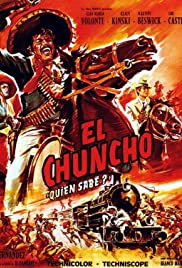
QUIEN SABE? (A BULLET FOR THE GENERAL)
Italy, 1967, 112 minutes, Colour.
Gian Maria Volonte, Klaus Kinski, Lou Castel.
Directed by Damiano Damiani.
Quien Sabe? is a vigorous example from the '60s of the spaghetti western. It was produced at the same time that Sergio Leone was making his mark with the 'Dollars' films and then The Good, the Bad and the Ugly and Once Upon a Time in the West. The star, Gian Maria Volonte starred in some of Leone's films. Here he has a strong role as Chuncho, the Mexican bandit trying to steal and buy arms for General Elias, the Revolutionary General. He is joined by Klaus Kinski (later to be so striking in many films including Herzog's Aguirre, Nosferatu and Fitzcaraldo). Lou Castel has a good role as the American bounty hunter.
The film, in colour and scope, spends most of its first half in set pieces, violent and bloody massacres, train hold-ups, shootouts. The film comes to a more serious point towards the end with scenes of mutual betrayal - the realisation by Chuncho that he has been betrayed and his vengeance on his friend the bounty hunter. Themes of loyalty, friendship, causes and betrayal come to a head in quite a dramatic conclusion. This film illustrates both the strengths and weaknesses of the spaghetti western. Self-indulgence in action and violence spectacle, themes of relationships and the significance of the American and Mexican West. Direction is by Damiano Damiani, a director whose career was largely in making films derivative of other genres - The Tempter (with Glenda Jackson and Lisa Harrow), and in the United States, Amityville II: The Possession.
1. The impact of the Italian spaghetti western? Its looking at the American and Mexican West with European eyes? The homage to American westerns? The originality of the Italian style? This film as a good example of the spaghetti western?
2. Colour photography, Spanish locations, the suggestion of the West? Panavision? Landscapes, action sequences, the use of close-ups and profiles? Special effects? The musical score? The star cast?
3. The conventions of the spaghetti western: the quick establishing of situation, characters and action? The heavy emphasis on violent confrontations? Spectacular attacks and fights? The lack of attention to subtle motivation? The gathering together of themes at the end? The popularity of the spaghetti western?
4. The comparisons of plot with the American western? Characters, bandits, the military? Confrontations? Train robberies? Friendships and loyalties? The role of the Church in Mexico? Government, military, betrayals? The confrontation of hero and villain at the end?
5. The character of Chuncho: Gian Maria Volonte's vigorous presentation of the bandit chief? His pride, laughing? Simplicity and shrewdness? His violent action and cause for getting the guns? Robbing the train, shooting people, the various set-ups and the use of his team for robbing forts and getting away with ammunition? The ambiguity of his friendship with Tate? His understanding of his brother - and the later irony of his brother ready to kill him? The cause of Mexico, the peasants, the Church, anti-military? His saving the life of his friend - especially with the malaria? The final confrontation with the General? The desertion of the village and his being ready for execution? His brother about to kill him and his acceptance of this? His being rescued by Tate? The temptation to be transformed into an American bounty hunter, the money, the night with the prostitute? The final confrontation with Tate at the train and his killing him and raucous running away to further the cause of the Revolution? A subtle characterisation in an unsubtle type of film?
6. The contrast with Tate - the variation on the Man With No Name? Presence on the train? Suit, hat? Enigmatic watching? Youthfulness? His killing people and the puzzle for the audience? The handcuffs? His deceiving Chuncho? Joining the gang? Participation in the various sieges of forts? Shooting, observations? His friendship with Chuncho? The malaria and Chuncho's help? The infatuation with Adelita? His going away? His finally killing the General with the golden bullet? Saving Chuncho's life? His receiving the money from the military? The slick bounty hunter and his success? The irony of his being killed by his friend? Underestimating Chuncho's values and loyalties? His shock in death?
7. The strange character of Santo - the priest with the revolutionaries, Klaus Kinski's manic look, dress, words, cross? The death of the priest and Santo's preaching to the men? His simplicity and the explanation of his intensity by Chuncho? His participation in the raids? His belief in the cause? His preaching at the giving of the medals and leading the siege? His disgust with Chuncho and his readiness to execute him?
8. The revolutionaries and bandits? Their skills in robbing trains? The various sieges? Jealousies within the group? Loyalties to Chuncho? The desertion of San Miguel?
9. Adelita and her place in the group? Her man? The temptation to love Tate? Loyalties and pressures within the group? Her loyalty to Chuncho? Her leading the attack on the fort with the prostitutes?
10. The encounter with Don Felipe and his wife? The lords and the rule of Mexico and the revolutionaries' reaction? The attack of Don Felipe's wife? Adelita and her not wanting to spare her?
11. The screenplay's enjoying itself in its revolutionary tone, siding with the peasants, satirising and caricaturing the military and the government? The indulgence of the massacres?
12. The social points being made about oppression, the shoe-shine boy and Chuncho at the end, Chuncho's seeming transformation and willingness to go to America, to enjoy the fruits of exploitation rather than revolution? His final loyalty to the cause?
13. The popularity in the '60s and '70s of the spaghetti western? The European insight into the American West of the 19th. century? Insight into the traditional American western film?
Published in Movie Reviews
Published in
Movie Reviews
Tagged under
Saturday, 18 September 2021 18:47
Quicksilver
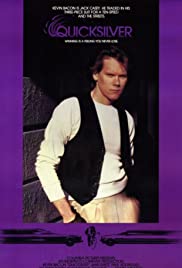
QUICKSILVER
US, 1986, 101 minutes, Colour.
Kevin Bacon, Jami Gertz, Paul Rodriguez, Larry Fishburne.
Directed by Tom Donnelly.
Quicksilver is the story of a young man talented at the Stock Exchange but losing his -money and opting for a more simple life of bicycle deliveries. However, in the bustle of city life lie becomes involved in other people's lives. The film is something of a drama about yuppies with a human touch.
Kevin Bacon (Footloose, Diner, She's Having a Baby) is quite engaging as the hero. Jami Gertz (Less than Zero, The Lost Boys) is the heroine. Paul Rodriguez (The Whoopie Boys) is good as the hero's friend- The film recreates the atmosphere of the city, the life of the cycle messengers, hopes and aspirations, and the background of drug deals. It was written and directed by Tom Donnelly.
1. Contemporary drama? Yuppy drama? The young adult?
2. The title, mercury and-change, the barometers of fortunes, riding like quicksilver?
3. The American city, hones and streets, the Stock Exchanges, companies, rug-running, the bike-riding and expert stunt work? Songs and score?
4. Jack and photos in the credit sequences, his success at the Stock Exchange, busy, wealth, the taxi racing the cyclist? His failing? Condemnation of himself? £he encounter with his father and his father's nonchalance, going back and seeing him weep?
5. Jack and his character, success, the taxi race, his job, success, friends? Failure? The cycling job, the friendship with Hector, the lonely girl, watching Gypsy and his brutality, the drugs? The visit to his father and mother, the consoling of his mother, trying to speak to his father, trying to get an emotional response? Their concern about him? His girlfriend, the dancer, living in. the warehouse? His skill on the bike, his skill in the job? The girl and her awkwardness, her lies? Her taking the drugs and delivering them? His friendship with Hector, Hector's ambitions, taking the money and going to the Stock Exchange? His friends at the Exchange, his enthusiasm and success? His chasing Gypsy and the fight? The pursuit and Gypsy's crash? The girl, the resolution? His growing up? Going with the girl to Hector's hamburger shop?
6. The girl, her background, lies, imagining great things about her parents? Work? Gypsy and his advances., getting her to do the drug delivery? In the apartment, antagonising Jack? Her being pursued by Gypsy, the fight, the chase? The ending and the possibilities of a better life?
7. Hector, his family the bike, helping the girl with buying the bike, money and hopes? The flash suit for the interview? The birth of his baby and excitement? The possibility of running drugs? Trusting Jack, cheerful, getting the finance and his shop?
8. Gypsy and his watching, brutal and flash style, pressure on Hector, pressure on the girl? The drugs? His antagonism towards Jack, the fight and the pursuit, the crash?
9. The firm, the workers, the bosses, the jobs?
10. The sketch of Jack's parents, his mother's concern, his father's lack of emotional- expression?
11. The city, the Stock Exchange, the successful brokers?
12. The city and its themes, values, quests in contemporary life?
Published in Movie Reviews
Published in
Movie Reviews
Tagged under
Saturday, 18 September 2021 18:47
Quick and the Dead, The/1987

THE QUICK AND THE DEAD
US, 1987, 86 minutes, Colour.
Sam Elliot, Kate Capshaw, Tom Conti.
Directed by Robert Day.
The Quick and the Dead is a western telemovie made for home box-office. It is based on a story by Louis Lamour. It has a strong cast led by Sam Elliott as a lone gunfighter, Kate Capshaw and Tom Conti as a pioneering couple, Matt Clark as a renegade doctor. The Midwest scenery and locations are beautifully photographed, a beautiful background for a story of pioneering, pursuit, violence.
1. Enjoyable western? Telemovie? The westerns of Louis Lamour?
2. The Wyoming settings, the Midwest photography? The planes, the town, the landscapes, the bills? Musical score?
3. The title, reference to characters, survival?
4. The dying town, empty, the men there, types? Doe Shabbutt and his hold over the men? The Breed and his joining the gang?
5. Duncan and Susannah, their story of the east, Pennsylvania, epidemic, arriving in the town, the invitation, passing through, setting up camp, the stealing of the horses? Vallian and his interest. advice, Duncan and the confrontation, Vallian shooting, the taking back of the horses?
6. Vallian and his quest: his background. Indian, the action and freedom in his life, passing through the town, the confrontation, chasing Breed - especially in relationship to his dead mother? Attraction towards Susannah, his comments, Duncan's reaction, Tommy's admiration? Continually with the family, sharing their experiences, offering advice, his warnings, coming to the rescue? The night and kissing Susannah? The shootings? Discussion? Confronting Breed at the goods from the wagon train? His being wounded? The family tending him? The final confrontation? His future. Duncan punching him, Tommy's last words, Susannah's farewell?
7. Duncan and Susannah, their relationship, hopes. Tommy? The wagon. the dangers? The confrontation for the horses? Susannah bashing Red in the night? The decision to take up the gun, gun practice? Duncan's memories of the violence of the Civil War? The pursuit, leaving their goods behind? The fights, survival? Finding the house, deciding to settle? Telling the truth to each other? Pride and love?
8. Doe and his meanness. the killings, his brothers, the pursuit? Red and his bashing, Breed and his being killed, the other deaths? The long journey, through the snow? The final confrontations and death?
9. The harshness of the west, opportunities, dangers? The American heritage?
Published in Movie Reviews
Published in
Movie Reviews
Tagged under
Saturday, 18 September 2021 18:47
Question of Silence, A
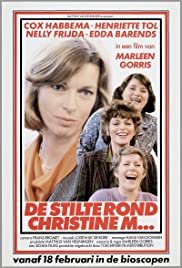
A QUESTION OF SILENCE
Netherlands, 1982, 95 minutes, Colour.
Edda Barends, Nelly Frijda, Henriette Tol.
Directed by Marleen Gorris.
A Question of Silence (The Silence Around Christine M.) is a powerful Dutch docu-drama which has important repercussions for feminist themes. It was written and directed by Marleen Gorris. The situation is quite contrived - but important for highlighting the roles of wen and women in contemporary society. Three oppressed women are shopping, they are treated patronisingly by the shop manager - they turn on him and murder him. There are some bystander witnesses. The women are arrested, go to prison, are interrogated by a woman psychiatrist. There is a court case and her testimony is presented. With the backgrounds of the three women, with the story of the psychiatrist and her relationship with her husband, issues surrounding women and their rights are dramatised. While the presentation is in many ways realistic, the treatment is much more symbolic, a type of psycho-drama.
The film is powerfully argued - one reviewer saying the important thing was dialectic rather than didactic method, the asking of questions rather than their being answered. The reviewer also noted that the constant appeal to common sense is the appeal to patriarchal presuppositions. The film is well acted, interestingly written - and a disturbing piece of entertainment.
1. An interesting and entertaining film? A parable of women's issues in contemporary society? The seriousness of the themes, treatment, motivation? The administration of justice? The feminist dialectic?
2. A Dutch production: setting, Dutch society, perspective? The universality of the theme and its treatment?
3. Life in the Dutch city: homes, offices, cafes, shops, jails, the courts? Authentic atmosphere - used realistically and symbolically?
4. The work of the writer-director and her feminine cast? Feminine sensibility, issues? Women's responses? Men's responses? A disturbing film?
5. The importance of the structure: the introduction to the psychiatrist and her husband and their relationship? Contemporary couple, sexual relationship, marriage, roles? Careers? The introduction to the three women - their background, the arrest? The later visualising of the crime? Prison, the court? The audience gaining the evidence piecemeal? Facts, evidence and interpretation? Questions of motive and justice? Realism,
6. The title - and the focus on silence, on Christine and her refusing to speak? The background of her being silenced by society and its attitude, her family? The silence as a symbol?
7. Audience response to the crime: its being dramatised objectively: the man, the shoppers, the clothes, service, the attack, the brutality, the joining in of the group, the bystanders? Audience reaction to the objectivity of the guilt?
8. Women and their dignity, as persons, as feminine persons? The masculine world and its effect: the office and the secretary and her being excluded from decisions? The cafe and the truckies etc., the home and expectations from husband and children? Silence, sexual harassment, appreciation? the pressures on women, their remaining silent, the potential to lash out - even to kill? The suppression of abilities, talent, personality? The man as a symbol of oppression, of hatred, of violence?
9. The women presented as real and as symbols? The men as real and as symbols: the psychiatrist's husband, lawyer, the boss in the office, the men at the cafe, the victim, the judge?
10. Christine: at home, her story, husband, children, the routines, her not having opinions, keeping silence? The build-up to the crime? Her response afterwards - the children at the fun fair? The bond with the other women? Her arrest, prison, silence? The psychiatrist not being able to break through? The complete withdrawal? Behaviour in the court, the final laughing? Christine as an indictment of men?
11. Andrea and her work, competence as secretary, sexual harassment, opportunities and her being passed over, under-used? Participation in the crime? Her acting out the role of the prostitute - the attraction of the hooker, the man assuming that she was, her leading him on, the sexual encounter and humiliating him? Arrest, prison, encounters -With the psychiatrist, articulate?
12. Annie as the rough diamond, raucous, the divorce, living alone, the encounters with the men, her work, used? Participation in the crime? Prison, reactions, down to earth?
13. Janine and her husband? The mirror of the world of the three women? Marriage relationship, the audience seeing the sexual relationship? Their skills and their work? Equality? The women being seen as honorary males? Her intelligence, professionalism? Entertaining? Comparisons with the three women? The rivalry with her husband and the masculine edge? Her work with the three women, no reaction from Christine, the bullying? Her becoming involved? The testimony and her trying to puzzle it out? Discussions with her husband, the lunches? The pressure tor her report? Her presenting it? Her husband's reaction against it? Her laughing in the courtroom? Janine as a potential killer?
14. The judges and questions of justice? The perspective of a man, he victim, the crime? The reaction to the women and the handing own of the decision?
15. Themes of normality, abnormality? The perspective of the police, the judge, the psychiatrist?
16. The importance of the laughter in the court - tension-breaker, laughing at the them, the hysteria, the laughing at situations? The observers in the court laughing?
17. The bystanders and their presence in the court, solidarity with the accused women, the tableau of the bystander women (age, occupation)?
18. The film as a psychodrama - enabling insight into feminist questions, perspectives?
Published in Movie Reviews
Published in
Movie Reviews
Tagged under
Saturday, 18 September 2021 18:47
Questor Tapes, The
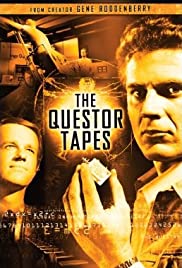
THE QUESTOR TAPES
US, 1973, 100 minutes, Colour.
Robert Foxworth, Mike Farrell, John Vernon, Lew Ayres, Dana Winter, James Shigeta.
Directed by Richard A. Colla.
The Questor Tapes is an entertaining piece of science fiction focusing on the creation of an android. What seems to be a film about menace and nuclear destruction turns out to be a rather optimistic picture of transcendent help for mankind. It was created by Gene Rodenberry, the creator of Star Trek, and shares the science fiction with philosophical and mystical reflection about human nature and interests. The film's dialogue resembles that of Star Trek - and fans may be able to see similarities between Mr. Spock and Questor. Robert Foxworth is effective in the central role and there is a good supporting cast.
The film goes for an atmosphere of realism until the end with its eerie special effects on Mt. Ararat. At times this kind of reflective science fiction can seem pretentious, but on the whole it is entertaining - and even uplifting.
1. The appeal of science fiction? What if ... ? The interpretation of the present via a possible future? The blend of reality and fantasy?
2. The work of Gene Rodenberry? Development of science fiction, the visual impact of science fiction? Reflection on human nature and its strengths and weaknesses? The importance of some kind of help for human nature? The theme of logic versus emotions? The complementarity of the two? As personified in Mr. Spock? Questor?
3. The visualising of technology? The skills in creating an android? The location photography: United States, Britain, Turkey? The blend of reality and fantasy? The special effects - especially at the end? Atmospheric score?
4. The possibility of creating an android? Technological skill? The nature of robots? Machines becoming human? The theme of the robot and its seeming humanity indicating the lack of humanity in mankind? Tensions about building androids? The power of the scientist, control over the workings of the android for good or for evil? Tapes and information? The erasing of tapes and the elimination of emotion?
5. Questor and his presence in the laboratory? The visualising of the android? His being programmed? Waking up? Humanising himself, seeking his creator's tapes, seeking out Robinson to accompany him to his maker? The human style for the programmed robot? His mannered mechanical way of speech? His becoming more and more human? His lacking emotions and trying to understand them? Expressions of logic? Understanding of friendship? Desire for emotions? Farrell's response to him as a friend? The audience sharing this response?
6. Robinson and his genius, cantankerous behaviour, questions? Derro and his guarding him? The escape? Getting to the airport, the flight to London - with the touch of comedy? Difficulties in England? The taxi to Lady Helena's house?
7. The background of the scientists in Los Angeles, their contribution to the project, discussions, questions? The briefing for the scientists and the pursuit of Questor? Derro and his going to London? Robinson's giving him the information? The shooting of Questor and returning him for reconstruction? Placing the bug in him?
8. Lady Helena and her background? Audience suspicions? Espionage ring -her household and attendants? Questor's plan for Robinson's getting the information via an affair? Lady Helena's behaviour? The revelation of the Centre as regards information? Questor failing to find his creator, leaving the farewell tape? His wandering in the park to observe children? The discovery of Mt. Ararat?
9. His being shot, the operation and his guiding Robinson in fixing him? Derro's watching it? The bargains?
10. The significance of the journey to Mt. Ararat? The background of visitors from outer space and their guiding of humanity? The creator and his death? The meaning of the continuity of the androids and their commission to help human beings while letting them make their mistakes? Derro's decision to leave Robinson help Questor in his mission? Derro and his flight and the bug and self-sacrifice?
11. How well did the film work as science fiction? The popularity of pop mysticism in science fiction in the '70s?
Published in Movie Reviews
Published in
Movie Reviews
Tagged under
Saturday, 18 September 2021 18:47
Question of Love, A

A QUESTION OF LOVE
US, 1978, 100 minutes, Colour.
Gena Rowlands, Jane Alexander, Ned Beatty, Clu Gulager, Bonnie Bedelia, Jocelyn Brando.
Directed by Jerry Thorpe.
A Question of Love is a significant telemovie. Both Gena Rowlands and Jane Alexander are excellent in the leading roles. Ned Beatty is also very good as the lawyer. The film is a piece of Americana, a portrait of aspects of domestic life and a look at the administration of American justice.
What makes the film different is that it concerns two lesbians. Gena Rowlands plays a mother who wants the custody of her younger son. Jane Alexander is her companion. The film portrays emotionally and intellectually the various facets of the question. The film takes emotional sides with the women, but shows, fairly, the arguments from the point of view of the general public, the husband and the lawyer.
Films like this, made for home audiences, are valuable opportunities for entering into the complexities of such issues rather than abstract reasoning about them, one way or the other.
1. The impact of this telemovie, interest, enjoyment, questions raised?
2. A piece of Americana, the American town, families, the courts? The American way of life and the challenge of the lesbian couple?
3. Audience presuppositions about families, lesbianism, the question of custody of children? The home audience like the jury - facing the situation, personalities, issues presented in legal way? The facts, moral issues and perspectives, law? Personal feelings? Feelings colouring decisions made?
4. The stance of the film - sympathy for the two women, but not omitting the points of view of the other characters?
5. The Gettners and their lifestyle: typical Americans, Mike and his role as husband and father, Laura Mae and her role as wife and mother, the boys? The aspects of their ordinary day by day life? Laura Mae's decision and the disruption, its effect on all? Emotional reaction? Puzzle and hurt? Mike and the American male? Reaction to his wife? Two the unusual issues, moral stances? David and his change? Reasons, the bribe of the car, his alleged disgust with his mother? Billy and his wanting to stay? The drama of the film as a divorce story and custody story - plus?
6. Laura Mae, her place in her family, relationship with her mother? Experience? Relationship with Barbara? The self-admission of lesbianism? Her explanation of meeting Barbara, keeping her company, moving in with her? The effect on her life, decisions? The change and the consequences for the family? The appropriateness of the lawyer asking her to make either-or choices?
7. The new home with Barbara and her daughter Susan? A girl living in this kind of household? A boy? Laura Mae and her love for her boys, David's turning away from her, Billy's love for her? A home full of love? The questions raised about patterning and modelling for male and female roles? The testimonies of the lawyers, the varying views of the psychologists? The future in such a household for Billy?
8. Gena Rowlands' strength as Laura Mae: credible woman, strong, relationship with her family, the clash with her mother and her mother making up? The going to see various lawyers and their reasons for refusal? The lawyer couple and their testing Laura Mae, accepting her case? Her understanding of her life, lesbian attitudes, behaviour? New lifestyle? A religious woman? Her capacity for loving? Her relationship with Mike? Clash with him, his stances in the court? Her experience of David's attack on her? The verdict, her having to cope, explaining the situation quietly to Billy? Future court appeals?
9. Barbara: an ordinary woman, her relationship with her husband, Susan? Her experiences, her explanation of herself in the court, her five-year relationship with another woman, her religious attitudes, her quoting John's Gospel 3:16? The support of the daughters of Bilitis? The importance of her testimony? Her support of Laura Mae, Laura Mae's initial exasperation with the situation and with her? Supporting her in her loss?
10. Mike as an ordinary man, work, not understanding his wife's behaviour, relationship with his sons? The testimony - and the part that went against him: his breaking Laura Mae's jaw, his drinking, paying for the abortion of the 18-year-old pregnant girl? His comeback with his conversion to church statement, his gaining the custody?
17. David, clash with his mother, turning against her, the car, bribe or not? His testimony in the court? Hurting his mother? Billy and his not wanting to leave?
12. The visits to the psychiatrist, the tests? The stances of the man, of the woman? Pros and cons of lesbian modelling for children? The woman favourable to Laura Mae - but her having to answer questions directly about her choices for her own children, where they would be brought up?
13. The various legal stances, the lawyers and their views, fears? The reasons for the couple taking on the case?
14. The lawyers and their help, conducting of the court, raising of objections, finding of evidence? Sympathy?
15. The prosecuting lawyer and his skill, presence, the ordinary man, wanting to win, the tenacity of his questions, insinuations, his being fair in arguing the questions? His expressing the person in the street's point of view? Intellectual and emotional presentation of issues?
16. The judge, his impartiality, clarifying issues? The jury? Their decision?
17. An appropriate way of raising social and moral issues? Legal issues? The need for this kind of film to help audiences understand questions of contemporary society?
Published in Movie Reviews
Published in
Movie Reviews
Tagged under